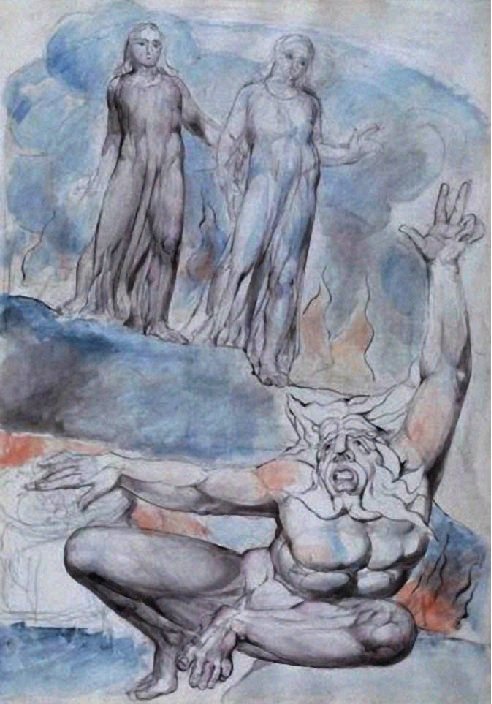Plutus
From Wikipedia, the free encyclopedia
Papé Satàn, papé Satàn aleppe is the opening line of Canto VII of Dante Alighieri'sInferno. The line, consisting of three words, is famous for the uncertainty of its meaning, and there have been many attempts to interpret it. Modern commentators on the Inferno view it as some kind of demonic invocation to Satan.
The line is a shout by Pluto. Pluto (also identified with Plutus and Hades) was originally the Roman god of wealth and the underground, but in the Inferno, Dante has made Pluto into a repulsive demon who guards the fourth circle, where souls are punished who have abused their wealth through greed or improvidence.[3] The full strophe, plus the following four, which describes Dante's and Virgil's entire meeting and confrontation with Pluto reads:
Original Italian text:
"Pape Satàn, pape Satàn aleppe!",
cominciò Pluto con la voce chioccia; e quel savio gentil, che tutto seppe,
disse per confortarmi: "Non ti noccia
la tua paura; ché, poder ch'elli abbia, non ci torrà lo scender questa roccia."
Poi si rivolse a quella 'nfiata labbia,
e disse: "Taci, maladetto lupo! consuma dentro te con la tua rabbia.
Non è sanza cagion l'andare al cupo:
vuolsi ne l'alto, là dove Michele fé la vendetta del superbo strupo."
Quali dal vento le gonfiate vele
caggiono avvolte, poi che l'alber fiacca, tal cadde a terra la fiera crudele.[4] |
One translation into English reads:
"Pape Satan, Pape Satan, Aleppe!"
Thus Plutus with his clucking voice began; And that benignant Sage, who all things knew,
Said, to encourage me: "Let not thy fear
Harm thee; for any power that he may have Shall not prevent thy going down this crag."
Then he turned round unto that bloated lip,
And said: "Be silent, thou accursed wolf; Consume within thyself with thine own rage.
Not causeless is this journey to the abyss;
Thus is it willed on high, where Michael wrought Vengeance upon the proud adultery."
Even as the sails inflated by the wind
Involved together fall when snaps the mast, So fell the cruel monster to the earth. |
The scant information that can be gleaned from the text is this:
- Virgil understands the meaning ("And that benignant Sage, who all things knew..."), and is replying.
- That the line is just the beginning of something else ("Thus Plutus with his clucking voice began...).
- It is an expression of anger ("And said: "Be silent, thou accursed wolf / Consume within thyself with thine own rage.").
- That it has the effect of a threat to Dante (And that benignant Sage, who all things knew, / Said, to encourage me: "Let not thy fear / Harm thee; for any power that he may have / Shall not prevent thy going down this crag.
 |
| Plutus from Blake's Illistrations of Dante's Inferno Wiki Commons |
Inferno: Canto VII ""Pape Satan, Pape Satan, Aleppe!" Thus Plutus with his clucking voice began; And that benignant Sage, who all things knew, Said, to encourage me: "Let not thy fear Harm thee; for any power that he may have Shall not prevent thy going down this crag." Then he turned round unto that bloated lip, And said: "Be silent, thou accursed wolf; Consume within thyself with thine own rage. Not causeless is this journey to the abyss; Thus is it willed on high, where Michael wrought Vengeance upon the proud adultery." Even as the sails inflated by the wind Involved together fall when snaps the mast, So fell the cruel monster to the earth."
The poet, as Bard, states that although England may be objectively a "rich and fruitful land", the unfeeling profit-orientated power of authority has designed for the innocent children suffering within it an "eternal winter". The biblical connotations of the rhetorical opening point us towards Blake's assertion that a country whose children live in want cannot be described as truly "rich". With the apparent contradiction of two climatic opposites existing simultaneously within the one geopolitical unit, we are offered a metaphor for England's man-made "two nations".
Blake wrote during the industrial revolution, whose pioneers congratulated themselves upon their vigorous increases in output. The poet argues that until increases in production are linked to more equitable distribution, England will always be a land of barren winter."
Blake's Poem:
Is this a holy thing to see
In a rich and fruitful land,
Babes reduced to misery,
Fed with cold and usurous hand?
In a rich and fruitful land,
Babes reduced to misery,
Fed with cold and usurous hand?
Is that trembling cry a song?
Can it be a song of joy?
And so many children poor?
It is a land of poverty!
And their sun does never shine,
And their fields are bleak and bare,
And their ways are filled with thorns:
It is eternal winter there.
For where'er the sun does shine,
And where'er the rain does fall,
Babes should never hunger there,
Nor poverty the mind appall.

No comments:
Post a Comment